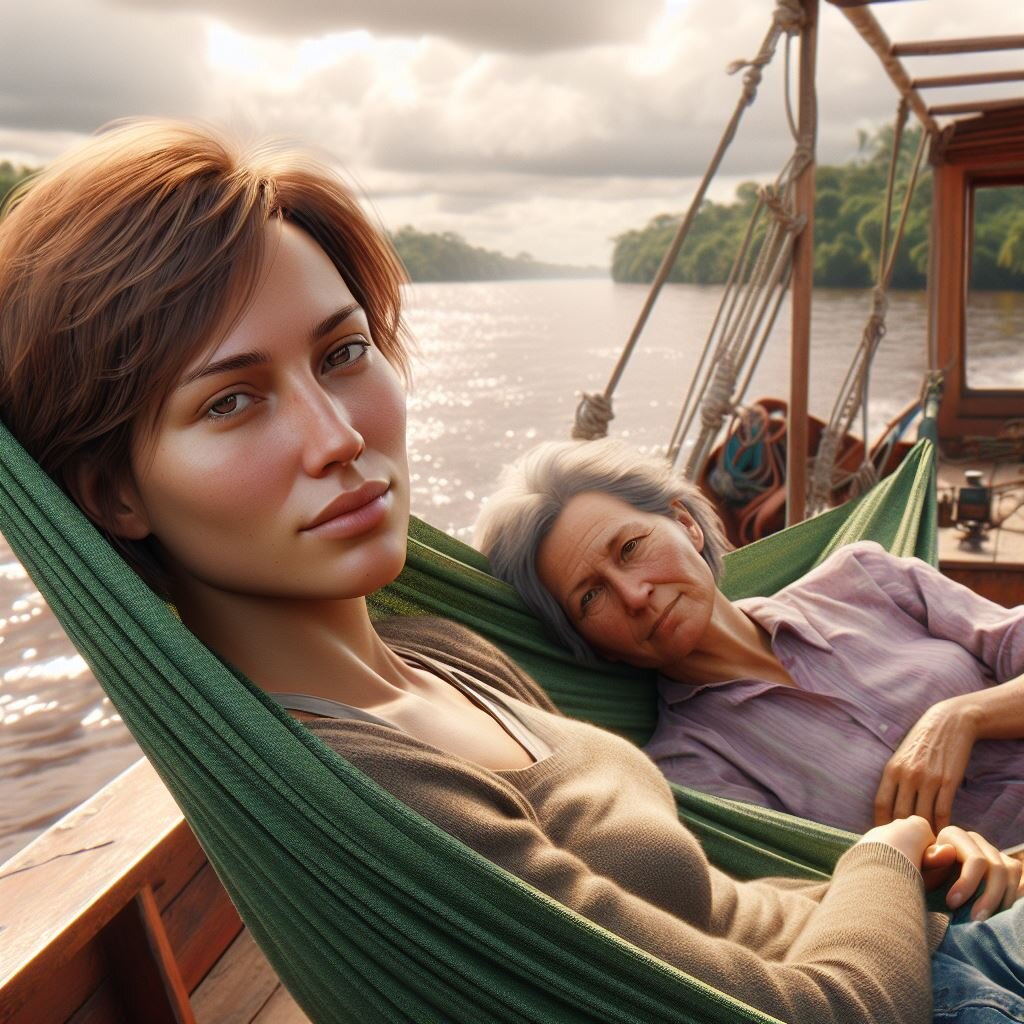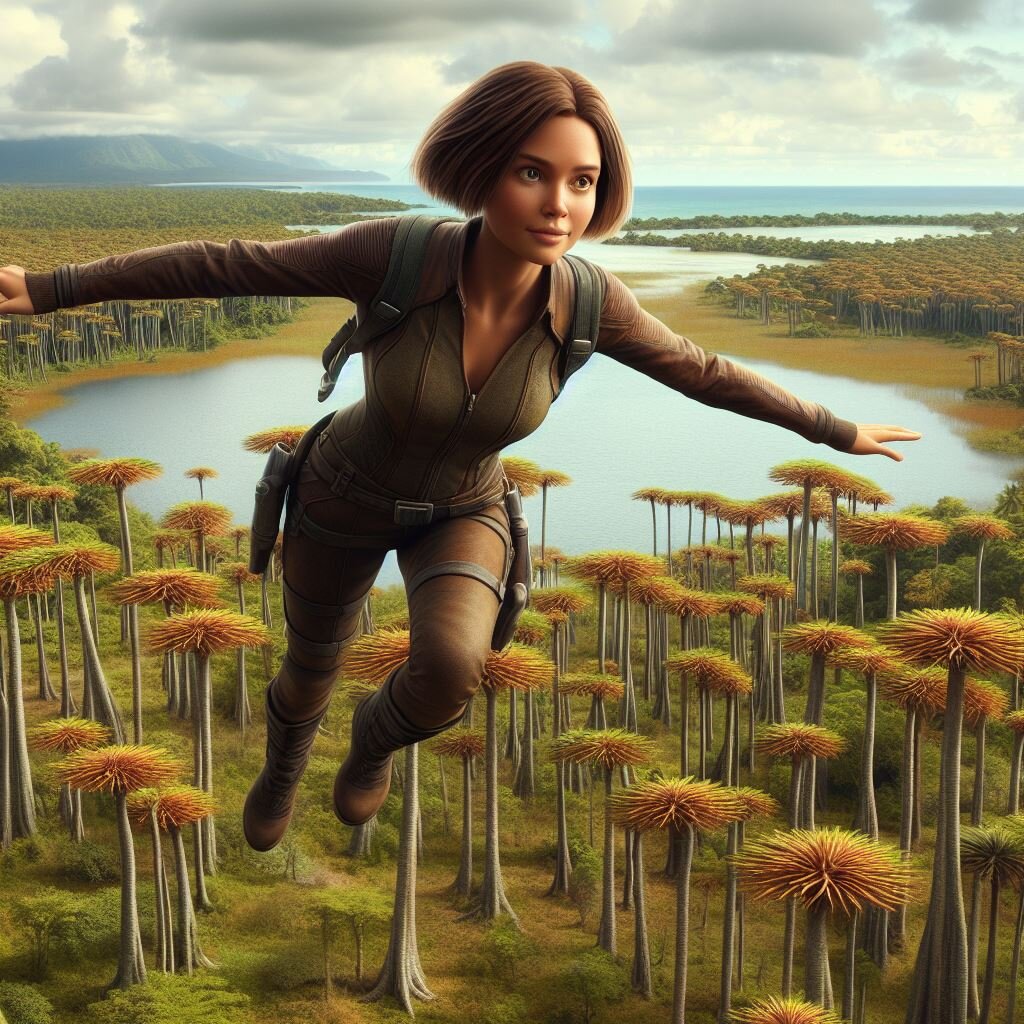Detoxing in the jungle
I've spent the last two and a half years studying the sand deposits that were formed in river deltas in the Western Amazon Basin 400 million years ago. The sea level at that time was considerably higher than it is today. The sea even covered a large part of what is now Bolivia. After this phase, the global sea level fell by around 200m, rose and fell again until it reached its current level. All these major changes, which have been controlled by climatic variations on Earth, have affected the location of river delta deposits over time. As these deposits are of interest to the oil industry, I got sponsorship to do fieldwork, collect samples and support myself during my master's degree.
Now that the dissertation has been submitted and I'm employed, I still dream about that period of high sea levels and tectonic upheavals that shook the Earth. Sometimes I imagine myself suspended in the air, admiring from above that Devonian forest, so much less lush than the Amazon rainforest of today, the great lakes surrounded by beds of Cooksonia, the climate colder than today due to the proximity of the Amazon to the Antarctic polar circle at that time. In my dreams, the tectonic plates that form the Earth shift endlessly, the sea level rises and falls according to the melting of the ice caps, the rivers recede towards their headwaters, or advance imposingly towards regions previously covered by the sea. I feel like a prisoner of time, trapped in a reality from 400 million years ago. "I think I need to do a detox, eliminate geology from my bloodstream," I say to myself as I look at the map of Brazil and the various tourist destinations I could choose for my next vacation. But all I can think about is going back to the Amazon.
The vacation is finally here. My mother has decided to travel with me; this will be our first trip together since I was a teenager! We've already strolled around Manaus, stayed in jungle lodges and done all those tours that apparently only foreigners love: alligator spotting, jungle walks, bathing in igarapé, visiting the floating houses of riverside populations, taking a boat trip to the meeting of the waters of the Rio Negro and Rio Amazonas, fishing for piranhas, etc. These tours are very interesting, but I still feel like I'm following in the footsteps of thousands of other tourists before me. I'd rather do something typical of the local population. So we decided to find out from the guides and search the internet about the tour options available and ended up choosing a regional boat trip from Santarém to Alenquer.
Looking at the map of the Amazon, we'll be traveling from south to north. We'll head northwest along the Amazon River, pass the immense lakes of Itarim and Pascoval and then cut through a multitude of sandy bars crossed by small rivers until we reach the igarapé of Alenquer. The journey will take six hours and we'll get there at 4pm. We prepared a small backpack with clothes for three days and finally set off. The boat's brochure said that the boat has space for hammocks (you need to bring your own hammock and rope), snack bar service/ambient music, communal toilets and an open-air area. And that's it: an open area on deck where you can only sit if you've brought a hammock. Nothing else. "And I thought that stretching out in a hammock was an option! But where do we sit if we don't have a hammock?" my mother asks me, discouraged at the prospect of spending six hours traveling standing up. While I search in vain for an answer, I look around and realize that we are the only ones on the boat who are traveling without a hammock.
The captain of the boat, who is watching our situation with curiosity, shyly approaches my mother. In his hands he has his own hammock, very white and smelling of soap powder, lovingly washed by his wife. The captain is a zealous employee and will spend the six-hour journey awake, carefully monitoring the course of the boat on which we are traveling. He offers us his hammock to rest in. He says he only has one, unfortunately. We'll have to take turns resting. "How kind, thank you very much," we say, grateful for what must be the hundredth kindness shown to us by the people of Amazonas in just a few days. "What a wonderful land," my mother comments sincerely, her gaze straying to the scorching sun in the sky.
Another passenger soon offers to hang the hammock with nylon ropes from the structure of the boat and, after a short discussion, my mother agrees to be the first and settles into the hammock. We then hear a faint rustling of the fabric as it gives way, and another noise, caused by my mother, who fumbles around in the hammock trying to find out what has happened. The hammock, weakened by the countless times it has been bleached, rips. My mother abruptly falls to the deck of the ship, accompanied by loud laughter from all the passengers, who quickly fall silent when they realize the embarrassing situation she is in. Two or three of the people closest to her help me to get her on her feet and find out if anything more serious has happened. Thank God all is well, and soon a new hammock appears, whose owner says he prefers to travel standing up. My mother can finally rest.
We arrive in Alenquer with the sun already low in the sky. The passengers soon disperse on their way home. There is only one person left in the port apart from us. It is a lady sitting nearby, smiling at us and seeming to have nothing better to do than stare at us. We approach her in search of information, and when we ask if there is a hotel nearby, she tells us yes. "There is only one hotel in town, a very good one, very close to the port. If you want, I can take you there". When we arrive at the hotel, she starts opening the doors to the rooms and the only bathroom in the corridor and asks us which one we want to stay in. We then discover that she is the owner of the hotel! My mother, always shy and not very sociable, soon disappears with the owner of the place. After some searching, I find them chatting under a tree in the square. Three hours later, when I return from my walk around the village, the two women are still sitting in the same place, talking. "What did you talk about so much, Mom?" I ask her as we eat a divine fish stew with rice and farofa. "About everything, and about nothing. About life," she replies enigmatically.
The next day, as we head out in search of a place to have breakfast, we are stopped by the driver of a jeep, who pulls up next to us and asks us bluntly who we are. "Tourists", I reply, "and you?".
- Oh, I'm the candidate for mayor of the town. My name is Zeca.
- Pleased to meet you, Dr. Zeca. We're called Ybbi and Nair. I'm a geologist and my mother is a dental surgeon. We live in Rio de Janeiro.
- What an honor to meet people so distinguished from the big city! I'm going to visit all the small settlements here in the countryside to do some political campaigning. It's a good chance for you to get to know the place. Would you like to join me?
- Yes, we do.
We got into the jeep and spent a good two hours driving around with the mayoral candidate, going to all the bars and markets in the countryside. At each stop, we were introduced to the locals as their distinguished friends from the big city. At the end of the tour, Dr. Zeca turns to us and suggests we visit a nearby waterfall. When we arrive at the place, we park the car in a corner of the road and head into the woods. Shortly afterwards, we came to a clearing where a waterfall could be seen in all its splendor. Its waters flow gently over a sandstone staircase, reflecting a thousand particles of light filtered through the domes of the trees, until they join the waters of a dark lake. Nature's work of art! "I bet they're Devonian deltaic deposits," I say in a half voice as I examine the sandstones. My mother looks on in dismay at yet another of her daughter's oddities. Dr. Zeca, on the other hand, will later comment to his constituents, between a glass of cachaça and another, on the bizarreness of these big-city people who travel to a place as beautiful as our Amazon and still have their minds occupied by old things.
Voltar


